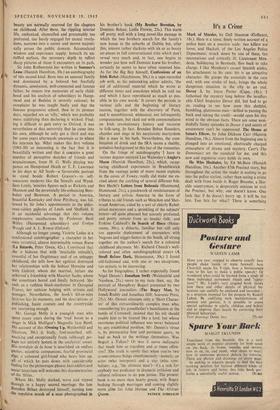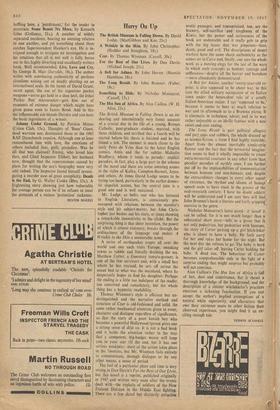It's. a' Crime
Mark of Murder, by Dell Shannon (Gollancz, 18s.). Here is a tense, finely written account of a police hunt on a massive scale: two killers are loose, and Hackett, of the Los Angeles Police Department, struck down by one of them, lies unconscious and critically ill. Lieutenant Men- doza, holidaying in Bermuda, flies back to take charge. I like Mendoza's casual Spanish asides, his attachment to his cats: his is an attractive character. He grasps the essentials in the case and, with one stroke of luck, brings the whole dangerous situation in the city to an end. Dover 3, by Joyce Porter (Cape, 18s.). I fathomed the mystery long before the insuffer- able Chief Inspector Dover did, but had to go on reading to see how soon this slothful, bumbling, gluttonous man—skilled in passing the buck and taking the credit—would open his tiny mind to the obvious facts. There are some won- derfully funny episodes in Dover 3 and snorts of amusement can't be suppressed. The House at Satan's Elbow, by John Dickson Carr (Hamish Hamilton, 18s.). Almost from the beginning one is plunged into an emotional, electrically charged atmosphere of drama and mystery. Carr's The Demotziacs set the standard for me, and this new and ingenious story holds its own.
He Who Hesitates, by Ed McBain (Hamish Hamilton, 16s.). Another 87th Precinct story, but throughout the action the reader is waiting to go into the police station, rather than seeing a crime dealt with from inside it. Roger Broome, a like- able countryman, is desperately anxious to visit the Precinct, but why, one doesn't know. One feels that if he doesn't hurry up, it will be too late. Too late for what? There is something baffling here, a 'puzzlement,' for the reader to penetrate. Some Beasts No More, by Kenneth Giles (Gollancz, 21s.). A number of widely separated incidents, bearing no seeming relation to one another, and yet something about them catches Superintendent Hawker's eye. He is in- trigued 'enough to instigate an investigation and his intuition • that all is not well is fully borne out in this highly diverting and excellently written book. Well recommended. Live, Love and Cry, by George B. Mair (Jarrolds, 18s.). The author writes with convincing authenticity of perilous situations arising out of deadly plotting on an international scale. In the hands of David Grant, secret agent, the use of his ingenious pocket weapons—nerve gas held in a shoe heel, the lethal `Parker Pen' microrocket—gets him out of moments of extreme danger which might have given pause even to James Bond. Add to this the inflammable ash-blonde Deirdre and you have the basic ingredients of a winner.
Johnny Under Ground, by Patricia Moyes (Crime Club, 15s.). Thoughts of 'Beau' Guest, dead wartime ace, dominated those at the 1965 RAF Dymchurch reunion. Although one at least remembered him with love, the emotions of others included fear, guilt; prejudice. Was he all that was claimed? Emmy, who loved him then, and Chief Inspector Tibbett, her husband now, thought that the repercussions caused by plans for writing the ace's biography were very odd indeed. The Inspector found himself investi- gating a murder case of great complicity. Death is the End, by G. Walter Cooke (Bles, 15s.). A frightening story showing just how vulnerable the average person can be if he refuses to meet the demands of a vicious 'protection' racketeer.
HESTER MAKEIG



































 Previous page
Previous page